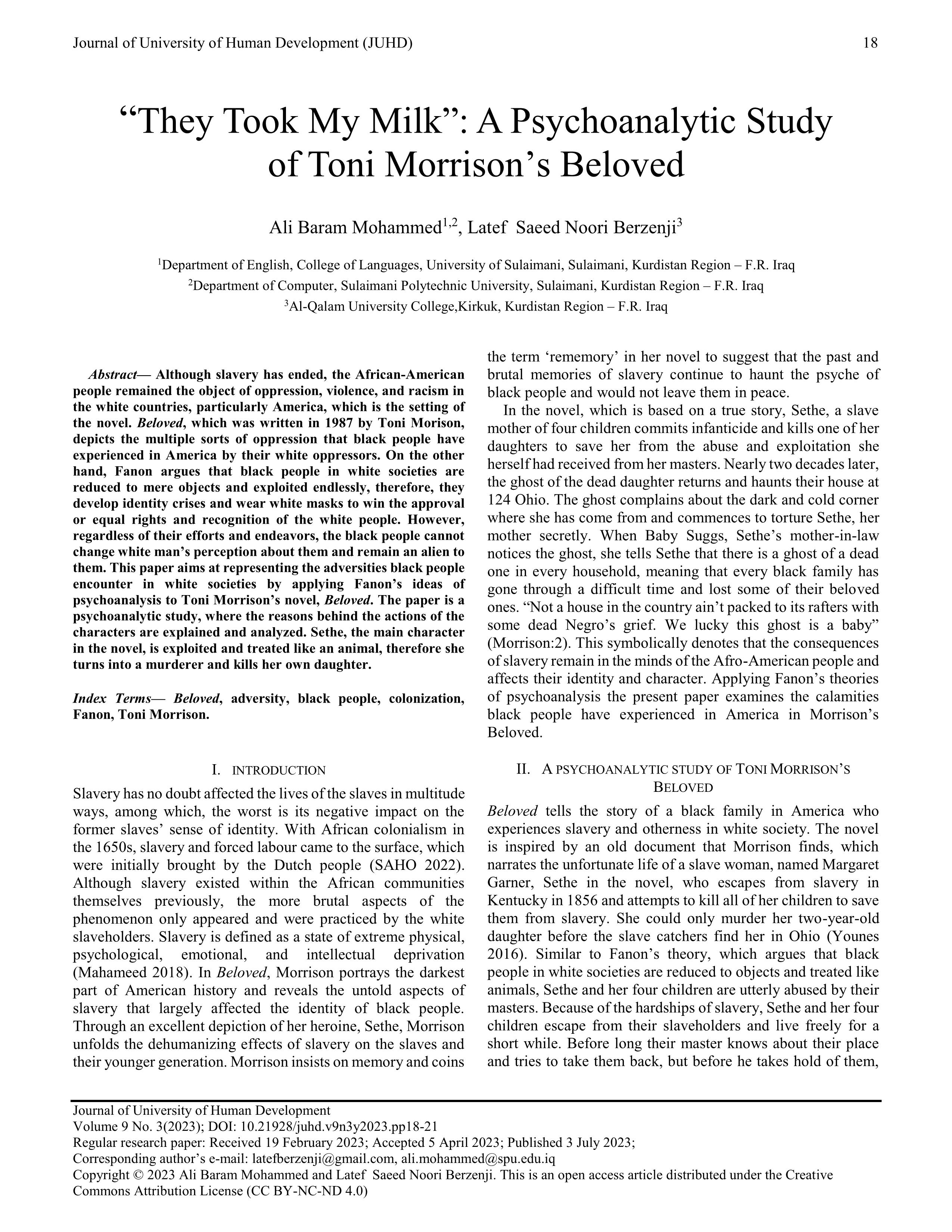“They Took My Milk”: A Psychoanalytic Study of Toni Morrison’s Beloved
DOI:
https://doi.org/10.21928/juhd.v9n3y2023.pp18-21Keywords:
Beloved, Adversity, Black people, Colonization, Fanon, Toni MorrisonAbstract
Although slavery has ended, the African-American people remained the object of oppression, violence, and racism in the white countries, particularly America, which is the setting of the novel. Beloved, which was written in 1987 by Toni Morison, depicts the multiple sorts of oppression that black people have experienced in America by their white oppressors. On the other hand, Fanon argues that black people in white societies are reduced to mere objects and exploited endlessly, therefore, they develop identity crises and wear white masks to win the approval or equal rights and recognition of the white people. However, regardless of their efforts and endeavors, the black people cannot change white man’s perception about them and remain an alien to them. This paper aims at representing the adversities black people encounter in white societies by applying Fanon’s ideas of psychoanalysis to Toni Morrison’s novel, Beloved. The paper is a psychoanalytic study, where the reasons behind the actions of the characters are explained and analyzed. Sethe, the main character in the novel, is exploited and treated like an animal, therefore she turns into a murderer and kills her own daughter.
References
Bonnet, M. (1997). "To Take the Sin Out of Slicing Trees...": The Law of the Tree in Beloved. Arfican American Review , 31 (1), 49.
Brison, S. (1999). Acts of Memory: Cultural Recall in the present. University Press of New England , 41.
Butts, H. (1979). Frantz Fanon's contribution to psychiatry: The psychology of racism and colonialism. Journal of the national medical association , 71 (10), 1016.
Fanon, F. (1952). Black Skin, White Masks. (E. d. Seuil, Ed., & C. L. Markmann, Trans.) UK: Pluto Press.
Fanon, Frantz (1967). Toward the African revolution; Political Essays . New York: Grove Press
Gordon, L. R. (2007). Through the Hellish Zone of Nonbeing Thinking through Fanon, Disaster, and the Damned of the Earth. Human Architecture: Journal of the sociology of self-knowledge , 9.
Jinpin, B. (2012). On Magic Narrative Technique in Toni Morrison’s Beloved. Cross-Cultural Communication , 8 (3), 1-7.
Kennedy, R. (1966). Robert F. Kennedy quotes . Retrieved 12 22, 2022, from Goodreads: https://www.goodreads.com/quotes/705426-each-time-a-man-stands-up-for-an-ideal-or
Kocabiyik, O. (2016). The Concepts of Memory, Forgetting and the Past in Toni Morrison’s Beloved. Mediterranean Journal of Humanities , 1 (2), 343-350.
Mahameed, Mohammed. "The impact of slavery in Toni Morrison's Beloved: From the communal to the individual." International journal of applied linguistics and literature 7, no. 6 (2018): 48.
McKay, Nellie, Andrews, & William. (1999). Toni Morrison's Beloved: a Case Study. New York, USA: Oxford.
Morrison, T. (1987). Beloved, Alfred A. Knopf Inc, New York, USA.
Partha, C. (1952). Frantz Fanon. Retrieved February 8, 2022, from Critics and Theorists : https://scholarblogs.emory.edu/postcolonialstudies/2014/06/19/fanon-frantz/
SAHO. "History of slavery and early colonisation in South Africa." South African History Online . June 1, 2022. https://www.sahistory.org.za/article/history-slavery-and-early-colonisation-south-africa (accessed 1 5, 2023).
Salama, S., & Alqadi, H. (2022). "Whiteness Hidden in Shades of Blackness”: A Psychoanalytic Fanonian Reading of Amiri Baraka’s Dutchman . Journal of Scientific Research in Arts , 23 (7), 31-32.
Tanritanir, B., & Aksak, O. (n.d.). Beloved: Showing the dehumanizing effect of slavery on Sethe. 252. Yüzüncü Yıl Üniversitesi .
Younes, B. (2016). History, Identity, Trauma and Narratives in Toni Morrison's Beloved in relation to “Black Lives Matter” , 7. Södertörn Univesity;School of Culture and Communication.

Downloads
Published
How to Cite
Issue
Section
License
Copyright (c) 2023 Ali Baram Mohammed, Latef Saeed Noori Berzenji

This work is licensed under a Creative Commons Attribution-NonCommercial-NoDerivatives 4.0 International License.


